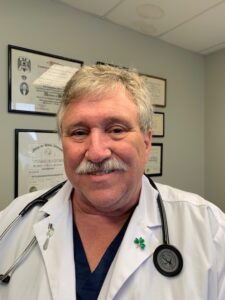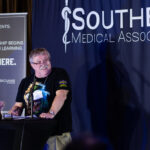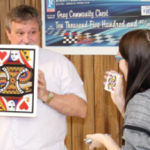In a career spanning more than 30 years, Christopher Morris, MD, a rheumatologist with Arthritis Associates of Kingsport, Tennessee, has dedicated himself to advancing the field of rheumatology and advocating for patients through a series of leadership roles.
Multidisciplinary Organizations
Notably, Dr. Morris served as president of the Southern Medical Association (SMA) from 2019–20. Based in Birmingham, Ala., and founded in 1906, the multidisciplinary group fosters the art and science of medicine through education.
A trivia buff and former Jeopardy! contestant (1988), Dr. Morris now creates questions for and hosts the Smart Bowl, a trivia competition sponsored by the SMA.
“It’s medical trivia for residents and medical students, and they participate in teams of four,” says Dr. Morris. “The winning team receives funds for a group party.”
The Smart Bowl, held at SMA’s annual meeting, draws contestants from across the Southeast. Leveraging his trivia background, Dr. Morris has crafted more than 300 questions for the competition.
Although he has long been active in rheumatology organizations, Dr. Morris says being a part of a multidisciplinary group, such as the SMA, offers a unique and broader perspective.
“This year, the SMA president is a surgeon,” notes Dr. Morris. “Last year, it was an internist, the year before that, an ENT. I was the first rheumatologist to serve as president.”
Dr. Morris’ history with the SMA predates his presidency by many years. He remembers attending SMA meetings with his grandfather, a thoracic surgeon and longtime member of the organization. “He was very proud of his involvement with SMA and told me it offered excellent clinical meetings,” Dr. Morris says. “I’ve found that being a member of SMA helps me stay up to date on developments that impact rheumatology.”
For example, Dr. Morris cites the influx of new medications for weight loss and diabetes. “We were learning about these new GLP (glucagon-like peptide-1) treatments three years ago, not just for weight loss, but also for their potential to help patients with psoriatic arthritis and other rheumatic diseases meet their treatment goals,” he says.
Dr. Morris encourages other rheumatologists to join multidisciplinary medical organizations, emphasizing the value of sharing knowledge with physicians outside their specialty. He notes that SMA members often reach out to him with rheumatology questions or invitations to give talks.
“I’ve given talks to internal medicine physicians and others to expand their rheumatologic knowledge,” he says. “Many primary care physicians receive little to no education in rheumatologic diseases. Being part of an organization like SMA allows me to ensure topics like rheumatoid arthritis, gout and other rheumatologic concerns are included in discussions.”




